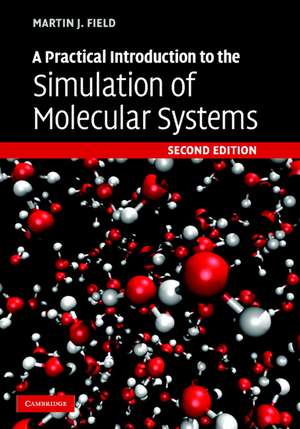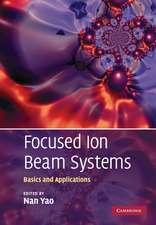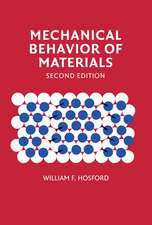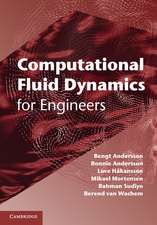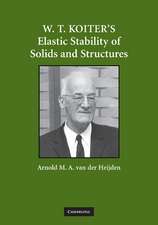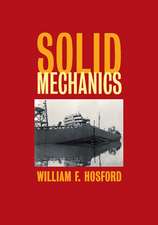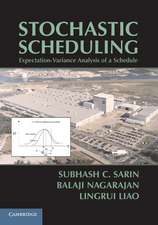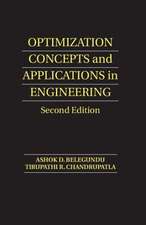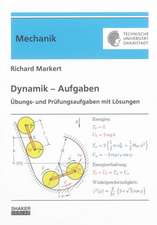A Practical Introduction to the Simulation of Molecular Systems
Autor Martin J. Fielden Limba Engleză Hardback – 18 iul 2007
Preț: 935.76 lei
Preț vechi: 1088.09 lei
-14% Nou
Puncte Express: 1404
Preț estimativ în valută:
179.05€ • 187.45$ • 148.16£
179.05€ • 187.45$ • 148.16£
Carte disponibilă
Livrare economică 15-29 martie
Preluare comenzi: 021 569.72.76
Specificații
ISBN-13: 9780521852524
ISBN-10: 0521852528
Pagini: 344
Ilustrații: 26 exercises
Dimensiuni: 180 x 255 x 20 mm
Greutate: 0.84 kg
Ediția:2Revizuită
Editura: Cambridge University Press
Colecția Cambridge University Press
Locul publicării:Cambridge, United Kingdom
ISBN-10: 0521852528
Pagini: 344
Ilustrații: 26 exercises
Dimensiuni: 180 x 255 x 20 mm
Greutate: 0.84 kg
Ediția:2Revizuită
Editura: Cambridge University Press
Colecția Cambridge University Press
Locul publicării:Cambridge, United Kingdom
Cuprins
Preface to the second edition; Preface to the first edition; 1. Preliminaries; 2. Chemical models and representations; 3. Coordinates and co-ordinate manipulations; 4. Quantum chemical models; 5. Molecular mechanics; 6. Hybrid potentials; 7. Finding stationary points and reaction paths; 8. Normal mode analysis; 9. Molecular dynamics simulations I; 10. More on non-bonding interactions; 11. Molecular dynamics simulations II; 12. Monte Carlo simulations; Appendix 1 - The pDynamo library; Appendix 2 - Mathematical appendix; Appendix 3 - Solvent boxes and solvated molecules; Bibliography.
Recenzii
Review of the first edition: 'This text straddles the boundary between theory and experiment … Martin Field's book is aimed at the novice user who is likely to be a graduate student or researcher in computational chemistry or biophysics. The provision of example programs ensures that readers should achieve a reasonable understanding of how simulations are performed and how the programs work … This book is likely to spend much time sitting next to the mouse by a terminal.' The Times Higher Education Supplement
Review of the first edition: ' … this textbook is presented in an interesting style and is quite readable, even for relative newcomers to this field. It is certainly an appropriate book for the advanced undergraduate or graduate course level, and will be a valuable teaching aid for those presenting this topic. It should be of interest not only to the physical chemist, but also to those involved in computational biophysics, biochemistry or molecular physics.' Scientific Computing World
Review of the first edition: 'The book is a good introduction to simulation. It is suitable for university course work, including computer practicals … as well as for training company employees new to molecular simulation.' Florian Müller-Plathe, Angewandte Chemie
Review of the first edition: 'The book should be particularly useful to all active practitioners in molecular simulation techniques, chiefly graduate students and researchers in universities and industry … this book is a valuable addition to my shelf and one that I must make sure doesn't disappear because my research group has taken off with it!' Neil L. Allan, Chemistry and Industry
Review of the first edition: ' … this textbook is presented in an interesting style and is quite readable, even for relative newcomers to this field. It is certainly an appropriate book for the advanced undergraduate or graduate course level, and will be a valuable teaching aid for those presenting this topic. It should be of interest not only to the physical chemist, but also to those involved in computational biophysics, biochemistry or molecular physics.' Scientific Computing World
Review of the first edition: 'The book is a good introduction to simulation. It is suitable for university course work, including computer practicals … as well as for training company employees new to molecular simulation.' Florian Müller-Plathe, Angewandte Chemie
Review of the first edition: 'The book should be particularly useful to all active practitioners in molecular simulation techniques, chiefly graduate students and researchers in universities and industry … this book is a valuable addition to my shelf and one that I must make sure doesn't disappear because my research group has taken off with it!' Neil L. Allan, Chemistry and Industry
Notă biografică
Descriere
Updated edition introducing a wide-range of techniques for the simulation of molecular systems at the atomic level. Employs Python.
